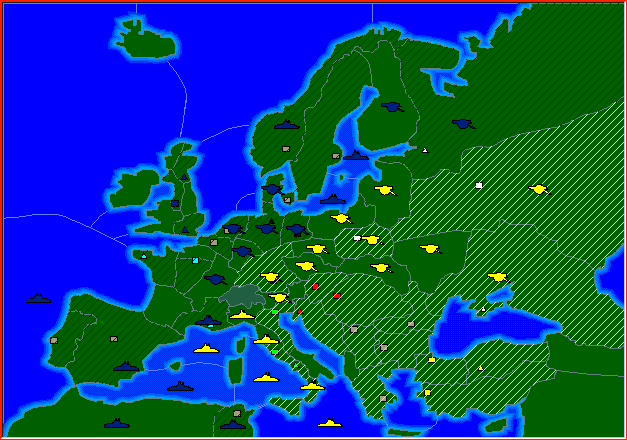


|
Sherlock Holmes,
Consulting Diplomat
by David Norman,
Master Aenigmatist
(transcribed by Charles Roburn)
|
The Case of the Witches' Endgame
My friend Holmes has done great sevices for the Empire through his mastery of Diplomatic logic, by solving many profoundly baffling puzzles I have already chronicled — such as The Double Elimination Conundrum and The Strange Case of the Confederation of Neutral States. However, not all of his efforts involved such momentous consequences. I offer the following tale as a simple example of how my friend's powers of deduction and logic made him capable of observations that escaped players less perspicacious than himself.
The circumstances arose one evening at the Calhamer club, during a game where my France had unfortunately suffered an early defeat at the hands of a determined Anglo-German coalition. The EG alliance had continued to sweep the board from one side while a Russo-Turkish alliance progressed on the other, until the two corner powers had each stabbed their erstwhile partners. At that point the game had fast become a race between the two remaining viable powers, England and Turkey, to get to eighteen first.
By the end of Winter 1911, the two witches were the only countries left on the board. The position was as follows:
| England: |
F Tun, F NAf, F WMS, F MAO, F Spa/sc, F Mar, A Bur, A Ruh, A Hol,
A Kie, A Ber, A Den, F Bal, F GoB, A StP, F Nwy, A Fin |
| Turkey: |
F Ion, F Nap, F TyS, F GoL, F Pie, F Tus, A Tyr, A Boh, A Mun,
A Sil, A Pru, A War, A Lvn, A Mos, A Ukr, A Gal, A Sev |

My friend Holmes entered the room just as the good Reverend Codlington, who (ironically, I rather thought) had been directing the armies of the Caliphate, offered a two-way draw to Augustus Fotheringay. His Lordship accepted the clergyman's offer with alacrity, and seemed reasonably pleased at the result. Holmes was standing some way apart from the main table; I believe that I was the only one to hear him expel his breath in a quiet snort of disapproval.
Later, when we were back in Holmes' drawing room at 221B Baker Street, I expressed curiosity at his apparent disapproval of Fotheringay's quick acceptance of the proferred draw.
"Surely, Holmes," I said, "the two Powers were more or less equally matched! They were equally divided almost exactly along the main stalemate line."
My friend puffed on his pipe, then shook his head. "Almost, Watson. But not quite."
"Do you believe, then, that one of them could have forced a win?" I pressed him further.
"Perhaps not forced, Watson; but the advantage one player had over the other was so great that only a most miraculous guess on the defender's part could have prevented an eventual victory." He took another leisurely puff on his pipe. "Do you not see it?"
 Can you tell which country had the advantage, and explain why?
Can you tell which country had the advantage, and explain why?
Intrigued, I took the Diplomacy set down from the shelf, and duplicated the final position. I then attempted to follow that process of logical deduction which my friend has so often tried to impart to me (with, I am afraid, mixed results).
"Almost a stalemate," I mused. "Well, England has crossed the main stalemate line at Tunis, that much is clear. And Turkey has done the same at Munich." Holmes nodded. "This leads me to believe that one of those two centers must be vulnerable."
"Indeed" said Holmes. "So far your reasoning is sound."
"Looking at it more closely," I continued, "it is clear that Tunis cannot be immediately taken — England's defensive support from F NAf is uncuttable. Nor is it required to defend any other space in the line. Turkey can muster no more than two units to attack Marseilles or the Western Mediterranean, which are adequately defended by F SPA/sc and F MAO respectively."
My friend the great detective nodded. "Very good, Watson." he said. "Pray continue."
"Looking at it from the Turkish side, the fleets in the Gulf of Lyons and Tyrrhenian Sea are also adequately defended against any attacks by the Royal Navy, as the Turkish fleets in Piedmont, Tuscany, Naples, and the Ionian Sea are all in position to offer uncuttable defensive supports. So," I went on triumphantly, "the advantage of which you speak is not be found on the Mediterranean front."
Nodding approvingly, Holmes gestured with his pipe for me to carry forward with my reasoning.
"This leads us to examine the central European front next. England has four armies available for a possible attack on Munich; two units able to strike at Prussia; and three ready to advance into Livonia." I counted. "Therefore, in order to guard against all possibilities, Turkey requires a total of six armies in supporting positions to guard all three of the forward units in those provinces I have mentioned — one to support Prussia, two for Livonia, and three for Munich. A quick glance is sufficient to reveal that the Sultan only has such armies in Moscow, Warsaw, Silesia, Bohemia and Tyrolia — a mere five. So," I continued eagerly, "That must be the solution you mean! If England continues to attack these three areas, one of them cannot help but fall eventually! As you say, only the most miraculous succession of guesses could prevent it!"
Holmes had been listening with increasing interest. However, at this point he shook his head. "No, Watson. You grasp many of the principles, but that is not what I mean." he said gently. "I referred to one miraculous guess, not many. Though your answer may seem the obvious solution, it is not correct."
Somewhat irked at having my logic so dismissed, I pressed him for a further explanation. "How can this be, Holmes? Surely six English units must in time overpower five Turkish armies!"
Wordlessly, Holmes extended his arm out to the nearby bookcase, and tapped the spine of one of the tomes therein. I stepped forward to examine it more closely. It was, of course, Professor Wilfred Pennington-Smythe's seminal treatise, On the Manifold Virtues of Dynamic Defense in Diplomacy.
"It is not enough for England to break the line, Watson;" he continued, "he must do so while keeping all the centers he already holds! Consider what happens if Turkey uses his army in Silesia actively to attack Berlin rather than to support Munich or Prussia defensively. If England uses Berlin to support another English unit's move to Munich or to Prussia, that support is cut. If he instead moves Berlin itself in the attack, then the Berlin supply center is open to Turkey. So even in the case of a successful attack on Munich, England merely trades that center for Berlin, leading to a true stalemate. Indeed," he went on with some impatience, "you may recall that this attack is exactly the defense the good Reverend used on the last turn of the game. That is why his Lordship accepted the proffered draw."
I was considerably chagrined and abashed at this declamation, for Holmes had already often impressed upon me the advantages of dynamic orders in preference to static ones. "What of the English fleet in the Baltic Sea?" I exclaimed. "Surely it could cover Berlin against such an incursion." Before Holmes could deny this, I corrected myself. "No, of course not — if Turkey orders Silesia to Berlin, he will surely also support that move with his army in Prussia. With England's other units already committed, that makes the conflict two to one."
Evidently I had redeemed myself somewhat with this observation, for Holmes nodded encouragingly once more. "Quite so."
"Then," I continued, "Turkey will use Warsaw and Moscow to support Livonia; order Prussia and Munich to support an attack from Silesia to Berlin; and use both Tyrolia and Bohemia to support Munich in place."
"Precisely, Watson."
"Then you are suggesting that England can still defeat this defense with the right set of orders." I concluded.
"Indeed; however, that represents only the first part of the question." my friend replied. "The second part is this: having made the correct set of orders, what should England then do in subsequent turns to convert his progress into a solo?"
I pondered the problem. I had no doubt as to the accuracy of my friend's understanding, and felt assured that the solution he mentioned must exist; but I was finding it difficult to discover! I contemplated the situation, searching desperately for another clue. Then I remembered something Holmes had said earlier in the conversation.
"Holmes, you indicated before that your solution is not sure," I began.
"It is not," he confirmed this earlier statement.
"Yet, from what you have said just now, it seems to me that it is indeed a forced solution. Is it? If not, then what prevents it?" I asked. "What is the 'miraculous guess' of which you spoke?"
"Ah, an excellent question, Watson." Holmes smiled briefly. "Together we have outlined the best defense for Turkey to use against England's superior numbers in the north. The Sultan can therefore be expected to use this defense every turn. The set of moves I have in mind for England can defeat this optimal defense and break the Turkish line without losing a center."
"But?" I urged him on.
"But… there is a set of Turkish orders that can counter these English moves, and result in a victory for Turkey instead. If the Sultan correctly guesses the turn when England will attempt to break the line, he can use this alternative defense that turn, and win. Therefore, the solution is not guaranteed: Turkey does have a chance, albeit a slight one." Holmes concluded.
And with this last hint, the great detective retired to his study, leaving me to puzzle out the answer if I could.
 |
What are England's orders for the turn he decides to attack?
What are the Turkish moves that will counter them and give Turkey the win?
If England's attack is successful, how does he convert his progress into a solo?
Mail your answers to The Pouch!
|
-- Dr. John H. Watson
If you wish to e-mail feedback on this article to the author, and clicking
on the envelope above does not work for you, feel free to use the "Dear
DP..." mail interface.






 Can you tell which country had the advantage, and explain why?
Can you tell which country had the advantage, and explain why?
